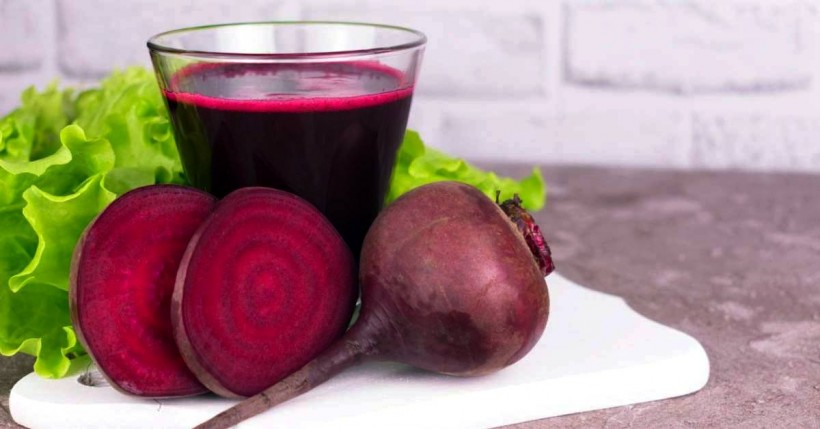6 Beet Kvass Benefits And Why Is Beneficial For People With Diabetes?
Warning: Undefined variable $post in /home/dietofli/public_html/wp-content/plugins/code-snippets/php/snippet-ops.php(584) : eval()'d code on line 3
Warning: Attempt to read property "ID" on null in /home/dietofli/public_html/wp-content/plugins/code-snippets/php/snippet-ops.php(584) : eval()'d code on line 3
The estimated reading time is 10 minutes
Warning: Undefined variable $post in /home/dietofli/public_html/wp-content/plugins/oxygen/component-framework/components/classes/code-block.class.php(115) : eval()'d code on line 3
Warning: Attempt to read property "ID" on null in /home/dietofli/public_html/wp-content/plugins/oxygen/component-framework/components/classes/code-block.class.php(115) : eval()'d code on line 3

If you are looking for another healthy fermenting recipe in your cooking repertoire, you should try one of the most beloved beverages from Slavic Eastern Europe. It is very popular in Russia and it has been used as a folk medicine for centuries for treating many diseases.
It is a Russian beverage that dates back to Middle Ages when water sanitation was questionable, so it was much safer to drink fermented drinks. It is a fizzy bread drink produced from rye or dried rye bread by natural fermentation. Kvass is very similar to Kombucha, another fermented drink you have probably heard of, as probiotic drinks have become very popular nowadays and are very much commercialized.
Kvass is great as it contains around 1.5% of alcohol by volume, and the fermentation gives it its distinctive soar flavor, providing healthy probiotics and a pleasant sparkling effect. But, of course, the sour taste is something Russians love. So, anything starting from soar cream to pickled cucumbers, pickled cabbage, mushrooms, and beetroot is the taste of real Russia.
Kvass Drinks Benefits
Moreover, it is known in many cultures that fermented (kvass) foods are rich in beneficial bacteria that increase the gut microbiome and lead to a better and more resistant immune system. Today, it is scientifically proven that fermented foods have many health-beneficial activities such as anti-microbial, anti-fungal, anti-diabetic, anti-inflammatory, antioxidant, and anti-atherosclerotic activity. (1)
Kvass is a probiotic drink and is made of good bacteria. These healthy bacteria are made when live yeast ferments and when they are ingested in your body they will build it up with good bacteria and help you with:
- Better digestion
- Lowering the bad cholesterol and the blood pressure (promotes heart health)
- Balance of the good bacteria in your organism
- Boost your immune system
In addition, the drink has a longer shelf life. Nevertheless, it contains some sugar and salt, and you may wonder whether they are good for your health.
Russians have invented thousand of kvass varieties as it was an everyday drink, very similar to coffee and tea nowadays. It prevented the famine and gave them a feeling of fullness.
As mentioned, there are many kvass varieties, and if you search, you will find that there are also beet and fruit kvass. They are developed as an extension of the original kvass recipe, as a result of dietary restrictions and of the many health benefits beet and fruits have.
We will discuss the benefits and side effects of kvass drinks, in particular the beetroot kvass drink that has many immune-enhancing properties.
Fermented Beetroot Kvass Benefits
Beetroots (Beta Vulgaris) are root vegetables known for their impressive health benefits as they are packed with essential minerals and vitamins.
100 gr of beetroots will provide you with: (2)
- Carbohydrates: 16 grams
- Sugar: 11 grams
- Fiber: less than 1 gram
- Copper: 13% of the Daily Value
- Manganese: 10% of the Daily Value
- Folate: 7% of the Daily Value
- Riboflavin: 4% of the Daily Value
- Magnesium: 4% of the Daily Value
- Vitamin C: 3% of the Daily Value
- Pantothenic acid: 3% of the DV
- Vitamin B6: 3% of the Daily Value
- Choline: 3% of the Daily Value
- Fat: less than 1 gram
- Calories: 65
- Protein: less than 1 gram
When beetroots are fermented, their benefits multiply as they are enriched with probiotics that will help you with intestinal flora and promote the beneficial bacteria's ability to synthesize vitamin K and produce B vitamins.
In addition, beets are rich in sugars and it is recommended to limit their intake when eaten raw. Fortunately, during the fermentation process, most of the sugar is fermented and consumed by the bacteria, so beetroot kvass is a much healthier version.
At the same time, beetroot's healthy ingredients are left intact, so let's see how fermented beets kvass can benefit your health.
-
It has had anti-inflammatory and anti-cancer properties
Beetroots are a rich source of bioactive compounds, betalains that have various health-promoting effects. They are natural color pigments and provide high antioxidant scavenging, anticancer and chemopreventive potential and one study showed they have an anti-inflammatory effect. (3)
They are also promising to be used as an alternative to coloring dyes that are used as food additives.
-
Boost athletic performance
The betalains and nitrates presented in the beetroot promote better blood flow to the muscles during high-intensity training. They will increase your stamina and improve your ability to exercise and run on long tracks. There is a study that confirms that beetroot's nitrate can improve the running performance and cardiorespiratory endurance in athletes. (4)
-
The drink has a better bioavailability
The fermentation process increases the bioavailability of the beetroots. When fermented, its compounds are more accessible to your body and the degree and nutrient absorption rate are much higher than the raw beetroot.
-
It is rich in probiotics and very beneficial for your gut health
Eating food rich in probiotics and drinks like kvass will boost your immune system and you will be less likely to be sick from cold and flu. (5)
It will also improve your digestive system health and restore the gut flora with good bacteria. In case you have digestive problems and unbalanced gut flora (when bad bacteria prevails), you will have many health problems such as candida, autoimmune diseases, skin issues and many digestive problems.
One study from Stanford University confirmed that fermented foods increase the microbiota diversity and decrease the inflammation markers. (6)
-
It is very beneficial for your liver health
The beets contain many phytonutrients, particularly betaine, made from b complex vitamin choline. This phytonutrient stimulates the function of the liver cells and prevents liver diseases.
One study showed that it has a positive effect on liver patients and may contribute greatly to survival after surgery and reduce the risks of postoperative mortality. (7)
In addition, it has been traditionally used as a remedy for liver and blood.
-
It can lower the blood pressure
The beetroot and beetroot kvass are rich in nitrate that is converted into nitric oxide when it enters our bodies. Nitic oxide can relax the blood vessels, which leads to lower blood pressure. One study showed that drinking dietary inorganic nitrate acutely reduces blood pressure in patients. (8)
If you have high blood pressure, you have an increased chance of getting heart disease, stroke, and death.
One other study confirmed that drinking 250 ml of beetroot juice on a daily basis can lower blood pressure. The blood pressure of one test group that drank the juice on a daily basis was lowered just a few minutes after the intake. (9)
Beet Juice Kvass Is Good And Has Positive Effects For People With Diabetes
As mentioned, beetroots have many proven benefits, but one 2014 study found that they can also regulate the sugar and insulin blood levels in people. Drinking around half a cup of beet juice per day may significantly suppress the blood sugar levels in healthy volunteers. (10)
In addition, diabetes can damage the blood vessels, which may lead to many health complications and this disease may affect your kidneys, heart, eyes, and many other parts of your body.
One other study found that beetroot's antioxidants can reduce the diabetes complications such as:
- cardiovascular disease
- kidney disease
- retinopathy
- neuropathy and diabetic foot disease (11)
Moreover, it may also be helpful in reducing insulin resistance ( a condition when your cells stop responding to insulin), but more research is needed since there were not many studies conducted to prove it, and the studies already conducted involved a small number of participants.
It is safe to be included in your diet if you have diabetes and it is encouraged by American Diabetes Association.
Beet Kvass Recipe
As already mentioned, beet kvas is a very healthy and nutritive drink. It is worth preparing it as it can be beneficial for your cardiovascular, cognitive, and cellular health and boost your immunity.
In addition, it improves digestion by combining the nutrients of beets with the probiotics from the fermentation process, and it is great for intestinal flora. It can boost your athletic performance and it is a great drink if you are a sportsman or a person who is engaged in some sort of sports activity.
The nutrition you'll find in a 6-oz serving of beet kvass:
- B vitamins (including folate).
- Vitamin C.
- Roughly 2 grams of dietary fiber, 1 gram of protein, and 6 grams of carbohydrates.
- Minerals like potassium, calcium, iron, magnesium, and manganese.
- Probiotics and food enzymes.
- phytonutrients and antioxidants (betalain).
How To prepare It?
You need only 4 ingredients to make this drink with an earthy and sweet-salty taste that you will love it. You will get around 8 cups of beet kvass.
Ingredients
- Three normal organic beets
- ¼ cup whey or sauerkraut juice
- 5 tbsp of salt — preferably Himalayan salt
- Filtered water
Instructions
- Chop washed beets ( do not grate them or chop very finely).
- Put the chopped beetroots in a large glass jar.
- Pour the salt to kill the harmful bacteria.
- Pour the whey or sauerkraut juice.
- Add the filtered (unchlorinated) water leaving around 1 inch of headspace at the top of the jar.
- Cover it with a lid or a towel ( be careful not to tight down the lid as the pressure may break your jar).
- Leave it at room temperature.
- You will see some bubbles and some brine may seep out of the lid, so you can place a plate to catch the fluid overflow.
- You can check it daily to taste it, release some gases produced during the fermentation, or skim the mold off, if produced.
- It is usually fermented after two-three days.
- Put it in the refrigerator and consume as desired when the taste is strong to your liking.
Preparation time: 5 min.
Side Effects Of Beet Kvass
- Beetroot is rich in oxalate and you may develop kidney stones the beetroot kvass has even greater oxalate content due to the fermentation process. If you have a history of kidney disease or some kidney issues, you should avoid taking this drink.
- It may significantly lower your blood pressure and if your blood pressures are low or fluctuating, you should avoid it or take it occasionally.
- You may get beeturia, and your urine and stool may become red or pink. This is because the beetroot pigment is very vivid and bright.
- It mat worsen gout ( a very painful form of arthritis) as it contains oxalates and this is one of the primary causes of gout.
- It can sometimes cause stomach issues as the potent Lactobacillus strains that grow and multiply with the help of starter culture used in beet kvass can be multiplied in excess, leading to bloating, gases, cramps stomach aches.
- You should refrain from taking beet kvass during pregnancy because is high in nitrites and pregnant women are sensitive to these.
- It may result in skin rashes in certain individuals, although it is very rare.
- You can prevent some of its side effects if you increase your water intake on a daily basis.
How Much Can Beet Kvass Be Taken Daily?
You can take half a cup (4 ounces) twice per day. But, moderation is the key, so do not exaggerate as the high level of probiotics may lead to bloating and gasses.
Conclusion:
- Kvass fermented drinks are rich in beneficial bacteria that increase the gut microbiome and lead to a better and more resistant immune system.
- Beetroots (Beta Vulgaris) are root vegetables known for their impressive health benefits as they are packed with essential minerals and vitamins and when fermented, their benefits multiply as they are enriched with probiotics that will help you with intestinal flora and promote the beneficial bacteria's ability to synthesize vitamin K and produce B vitamins.
- You need only 4 ingredients to make this drink with an earthy and sweet-salty taste that you will love it.
- You can take half a cup (4 ounces ) twice per day, but moderation is the key.
- There are some possible side effects, especially if you have low blood pressure and kidney health problems. You should also refrain from taking beet kvass during pregnancy because is high in nitrites and pregnant women are sensitive to these.














